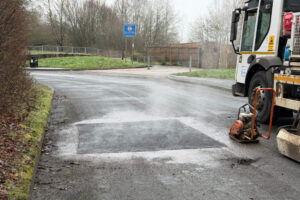Tarmac is urging highways specialists top consider new approaches when it comes to achieving permanent, lomng-lasting pothole repairs.
Talking on National Pothole Day (14th January), Tarmac said that with sustainability high on the agenda, it’s essential to make smarter choices when repairing potholes – helping to eliminate waste materials, avoid repeated cycles of failure and repair, and prevent unnecessary transport emissions.
According to the last Annual Local Authority Road Maintenance (ALARM) survey from the Asphalt Industry Alliance (AIA) into the condition of UK roads, the average cost of reactive pothole repairs in England and Wales was almost £73 – compared to just over £45.62 for planned repairs.
The dramatic difference in the cost of reactive and planned repairs illustrates how critical preparation and productivity are in reducing the cost of repairs and getting the most out of limited highways maintenance budgets.
Ryan Moss, commercial manager for Tarmac, said: “National Pothole Day is another opportunity to focus on the increasing challenges faced by those charged with maintaining our vital local infrastructure, as well as reflecting the economic importance of local roads as a key part of the UK’s overall strategic network.
“There’s no silver bullet but recent innovations promise to deliver positive outcomes when it comes to pothole management – particularly when prioritising a first-time-fix and, most importantly, sustainability.”
Tarmac’s online guide to pothole repairs explains the options available, along with the advantages of using newer, more sustainable technologies over conventional asphalt materials. It includes details of award-winning asphalts such as Ultipatch Sitemix, winner of Highways Industry Product of the Year in 2018.
The guide also features details on advanced repair materials that cure and harden more quickly in wet conditions, making them ideal for the unpredictable British weather.
In November 2021, Tarmac launched an online guide to sustainable road building, giving detailed advice and practical examples on choosing lower-carbon materials, guidance on increasing the use of recycled content and more on how to reduce waste.
























